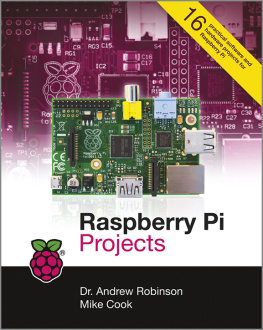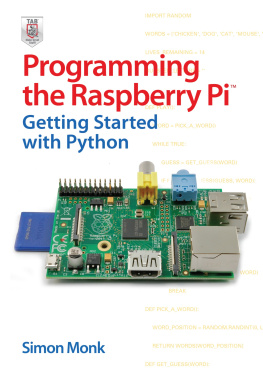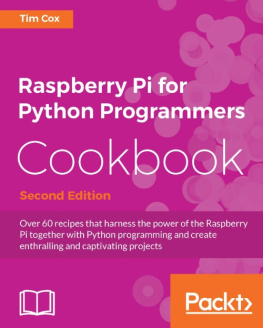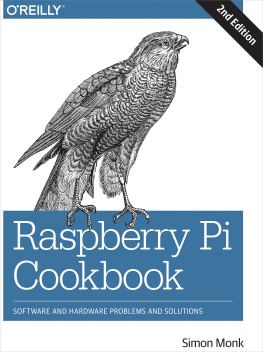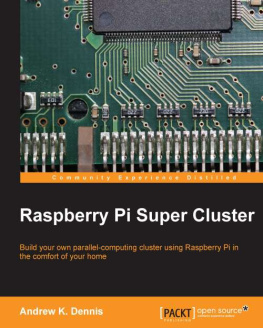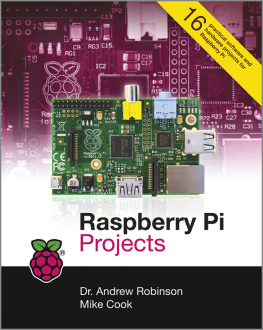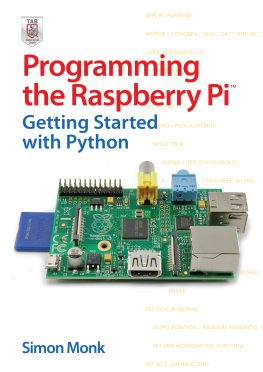Grimmett Richard. - Getting Started with Raspberry Pi Zero
Here you can read online Grimmett Richard. - Getting Started with Raspberry Pi Zero full text of the book (entire story) in english for free. Download pdf and epub, get meaning, cover and reviews about this ebook. genre: Computer. Description of the work, (preface) as well as reviews are available. Best literature library LitArk.com created for fans of good reading and offers a wide selection of genres:
Romance novel
Science fiction
Adventure
Detective
Science
History
Home and family
Prose
Art
Politics
Computer
Non-fiction
Religion
Business
Children
Humor
Choose a favorite category and find really read worthwhile books. Enjoy immersion in the world of imagination, feel the emotions of the characters or learn something new for yourself, make an fascinating discovery.

- Book:Getting Started with Raspberry Pi Zero
- Author:
- Genre:
- Rating:3 / 5
- Favourites:Add to favourites
- Your mark:
Getting Started with Raspberry Pi Zero: summary, description and annotation
We offer to read an annotation, description, summary or preface (depends on what the author of the book "Getting Started with Raspberry Pi Zero" wrote himself). If you haven't found the necessary information about the book — write in the comments, we will try to find it.
Create fun games and programs with little or no programming experience
Learn to use this super-tiny PC to control hardware and software for work, play, and everything else
Raspberry Pi Zero is half the size of Raspberry Pi A, only with twice the utility. At just three centimeters wide, it packs in every utility required for full-fledged computing tasks. This practical tutorial will help you quickly get up and running with Raspberry Pi Zero to control hardware and software and write simple programs and games. You will learn to build creative programs and exciting games with little or no programming experience. We cover all the features of Raspberry Pi Zero as you discover how to configure software and hardware, and control external devices. You will find out how to navigate your way in Raspbian, write simple Python scripts, and create simple DIY programs.
What you will learn
Understand how to initially download the operating system and set up Raspberry Pi Zero
Find out how to control the GPIO pins of Raspberry Pi Zero to control LED circuits
Get to grips with adding hardware to the GPIO to control more complex hardware such as motors
Add USB control hardware to control a complex robot with 12 servos
Include speech recognition so that projects can receive commands
Enable the robot to communicate with the world around it by adding speech output
Control the robot from a distance and see what the robot is seeing by adding wireless communication
Discover how to build a Robotic hand and a Quadcopter
Table of Contents
Getting Started with Raspberry Pi Zero
Programming Raspberry Pi Zero
Accessing the GPIO Pins on Raspberry Pi Zero
Building and Controlling a Simple Wheeled Robot
Building a Robot That Can Walk
Adding Voice Recognition and Speech - A Voice Activated Robot
Adding Raspberry Pi Zero to an RC Vehicle
Playing Rock, Paper, or Scissors with Raspberry Pi Zero
Adding Raspberry Pi Zero to a Quadcopter
About the Author
Richard Grimmett has always been fascinated by computers and electronics since his very first programming project that used Fortran on punch cards. He has a bachelors and masters degree in electrical engineering and a PhD in leadership studies. He also has 26 years of experience in the radar and telecommunications industries, and even has one of the original brick phones. He now teaches computer science and electrical engineering at the Brigham Young University, Idaho, where his office is filled with his numerous robotics projects.
Grimmett Richard.: author's other books
Who wrote Getting Started with Raspberry Pi Zero? Find out the surname, the name of the author of the book and a list of all author's works by series.

